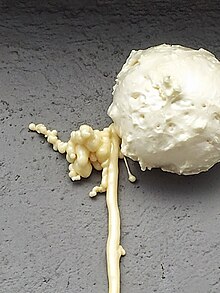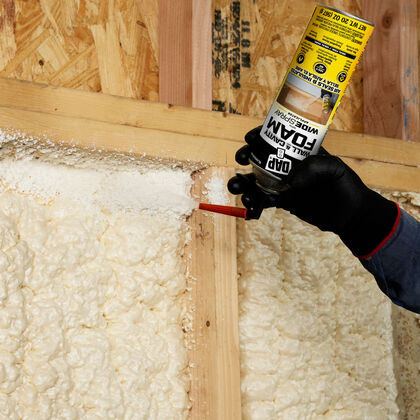Top Applications of Spray Foam for Residential and Commercial Properties
Top Applications of Spray Foam for Residential and Commercial Properties
Blog Article
Spray Foam: The Ultimate Service for Air Sealing and Insulation
Spray foam insulation has emerged as a leading remedy for effective air sealing and thermal insulation, using an unique combination of buildings that set it aside from typical approaches. Its ability to broaden and fill up voids makes it specifically effective in avoiding air leakage, which can dramatically influence power performance. Comprehending the full extent of its advantages, installment procedures, and contrasts with various other insulation types is vital for making educated choices. As we discover these elements, the ramifications for both brand-new buildings and retrofits end up being progressively considerable. What elements should influence your choice?
What Is Spray Foam?
Spray foam is a versatile insulation product that integrates the principles of air securing and thermal resistance to improve energy performance in structures. Composed largely of polyurethane or various other similar substances, spray foam is applied as a fluid that broadens upon contact with surface areas, producing a solid, constant layer of insulation. This distinct residential or commercial property allows it to fill up gaps, splits, and spaces that traditional insulation products may forget, offering a superior air seal.
There are 2 main kinds of spray foam: open-cell and closed-cell. Open-cell spray foam is lighter and much more adaptable, providing superb noise absorption and a reduced R-value per inch - Spray Foam. On the other hand, closed-cell spray foam is denser, giving a higher R-value, dampness resistance, and added architectural integrity to developing components
The application process typically entails customized tools, ensuring a smooth application that sticks to different substrates, consisting of metal, wood, and concrete. This versatility makes spray foam ideal for both brand-new constructions and retrofitting existing frameworks. Its capacity to create a closed obstacle significantly contributes to minimizing power consumption and boosting indoor air top quality, thereby making it a favored option amongst home owners and builders alike.
Benefits of Spray Foam Insulation
One of the most considerable benefits of spray foam insulation is its phenomenal ability to create a continuous air barrier, which successfully lessens power loss. Unlike standard insulation products, spray foam increases to load voids and splits, making certain that air leak is drastically reduced. This characteristic not just boosts power performance however likewise results in reduce utility bills over time.
Additionally, spray foam insulation provides premium thermal resistance, adding to an extra steady indoor environment. Its high R-value per inch allows for reliable insulation in constrained areas, making it optimal for attics, wall surfaces, and crawl rooms. Moreover, the moisture-resistant properties of spray foam aid stop mold and mold development, promoting healthier living problems.
One more critical advantage of spray foam insulation is its sound-dampening qualities (Spray Foam). It properly minimizes noise transmission in between rooms, developing a quieter and much more comfy home atmosphere. The sturdiness of spray foam additionally sticks out, as it does not sag or settle gradually, maintaining its efficiency throughout its life expectancy
How Spray Foam Functions
Comprehending just how spray foam insulation works is essential for valuing its effectiveness in air sealing and thermal resistance. Spray foam insulation includes two main components: isocyanate and polyol resin. When these parts are mixed, they go through a chain reaction that triggers the product to increase quickly, producing a thick foam that fills spaces, splits, and cavities.
As the foam broadens, it sticks to surfaces, forming a closed seal that dramatically reduces air infiltration. This characteristic makes spray foam insulation extremely reliable at preventing drafts and moisture penetration, which can result in power go to my blog loss and damages with time. In addition, the closed-cell variant of spray foam offers exceptional thermal resistance because of its stiff framework, properly decreasing warmth transfer.
The unique homes of spray foam enable it to comply with uneven surfaces, making sure detailed protection and a smooth barrier. As a result, spray foam insulation not only enhances power performance yet additionally adds to enhanced indoor air quality by decreasing the accumulation of allergens and toxins. Eventually, understanding the mechanics behind spray foam emphasizes its duty as a remarkable option for insulation and air sealing in both business and domestic applications.
Setup Refine Introduction

Before installation, the area has to be sufficiently cleansed and prepped, ensuring that surfaces are without dampness, particles, and dirt. Because contaminants can jeopardize bond and general efficiency, this action is vital. As soon as the location is prepared, the application entails blending both components of the spray foam, which expands upon contact and fills up spaces efficiently.
Trained experts must carry out the setup, using specific devices to make sure uniform protection and ideal density. Safety precautions, including wearing safety equipment and making certain correct air flow, are essential during this process. After application, the foam typically treatments promptly, creating a strong barrier that enhances energy performance.
Contrasting Spray Foam to Conventional Insulation
When assessing insulation options, spray foam insulation stands out in contrast to standard materials such as fiberglass and cellulose. One of the key benefits of spray foam is its exceptional air securing capacities. Unlike fiberglass and cellulose, which can enable air infiltration, spray foam increases upon application, filling up gaps and holes to develop a closed seal. This results in boosted power effectiveness, as less warmed or cooled air runs away the home, causing lower energy bills.
Additionally, spray foam gives a higher R-value per inch than traditional insulation kinds, supplying more reliable thermal resistance in a thinner profile. This characteristic is specifically useful precede with restricted dental caries depth. Spray foam is immune to moisture and mold development, which can be a substantial issue with cellulose and fiberglass, especially in moist environments.
Nevertheless, spray foam insulation commonly carries a higher in advance price than its traditional counterparts. House owners have to weigh this initial investment against long-lasting power savings and performance benefits. Ultimately, while both insulation kinds serve their purpose, spray foam becomes a much more sophisticated remedy for modern-day insulation demands, particularly in terms of air sealing and thermal efficiency.

Conclusion
In recap, spray foam insulation stands for a very reliable option for accomplishing ideal air sealing and thermal resistance. Its distinct homes, including moisture resistance and audio dampening, make it ideal for different applications in both new constructions and retrofitting projects (Spray Foam). The first expenses may blog here be greater compared to traditional insulation products, the long-lasting benefits, such as substantial energy financial savings and enhanced indoor air top quality, validate the financial investment and highlight its value in contemporary building techniques.
Spray foam insulation has arised as a leading service for reliable air sealing and thermal insulation, supplying a special combination of buildings that set it apart from typical techniques.Spray foam is a functional insulation material that incorporates the principles of air securing and thermal resistance to enhance energy performance in buildings.When reviewing insulation options, spray foam insulation stands out in contrast to typical materials such as fiberglass and cellulose. Inevitably, while both insulation types serve their objective, try this web-site spray foam emerges as a much more innovative solution for contemporary insulation demands, particularly in terms of air sealing and thermal performance.
In recap, spray foam insulation represents an extremely effective service for attaining optimum air sealing and thermal resistance.
Report this page